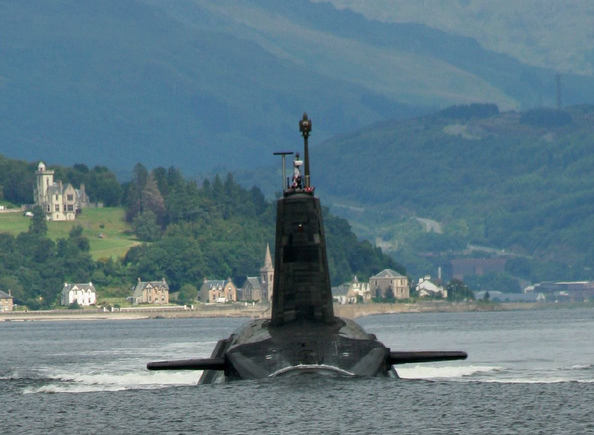Scottish independence has been pending for many years , or centuries if you take to that perspective, and now it’s closer than ever. It’s only a referendum away. There’s two issues tied to the discussion on Scottish independence that trigger my professional interest. First, is the Trident nuclear missiles – the UK weapons of mass destruction deployed and stored in Faslane, Scotland. What happens to those after independence? Second is the question whether independent Scotland will be – should be – part of NATO?
For a long time, the ruling Scottish Nationalist Party (SNP) held it that Scotland would neither become part of NATO nor allow England’s nuclear weapons to stay. But lately…..
Meanwhile, those who want Scotland to be part of NATO try to make the case that Scotland will automatically become member number 29 after independence, because it is now already, through the UK-construction, a member, sort of. This is not a rule in any of the NATO treaty documents that I’m aware of. So don’t be surprised if the same people claim exactly the opposite in another context or with regard to another country. Imagine, for a moment, that Turkish Kurds would gain independence after a limited military confrontation and a popular referendum. Would NATO membership be automatic?
This sort of opportunism works though – many Scots may hear it and think “Aye, what can you do”. Well here’s what you can do: use the one opportunity you get to properly discuss and then decide democratically whether or not your newborn country should be part of the world’s largest military alliance. It is not a weird question, regardless of the answer. Many very rational and responsible countries in Europe answered the question in the positive. Many equally rational and responsible countries in Europe answered it in the negative – Switzerland, Austria, Sweden, Ireland, Finland. Scotland would fit right in.
The importance of NATO membership has a lot to do with the second concern: the future of the UK nuclear warheads located on Her Majesty’s Naval Base Faslane, Scotland. The UK government keeps up to 185 nuclear warheads in Faslane. It’s all the UK has. So after independence, what remains of the UK (rUK for hip people) will become the only nuclear weapon free nuclear weapon state. It could, theoretically, join the Nordic Nuclear Weapon Free Zone and still threaten the light out of the eyes of any potential enemy, like … eehhmmm.
If – after independence – the Scots say the weapons need to go, the rUK has nowhere to put them. Or so the rUK claims. To be more specific, the rUK would not have anywhere to return them to. The normal habitat for a rUK weapon of mass destruction is not a secure bunker on shore, but somewhere deep under water on a submarine. That’s right, Her Majesty’s warheads are deployed on Her Majesty’s submarines. She personally christens them with names like “Repulse” and “Vengeance”, just so you known she could seriously mess you up if you happen to be within range. Anywhere within a radius of 7,360 km that is.
On a side note: Those UK subs are so stealthy that not even the French nuclear armed submarines can see them. And vice versa. This made for a good double blind experiment in 2009 when two nuclear armed and powered submarines collided in the Atlantic. They both never knew what hit them.
The UK government’s main argument for keeping its nuclear nightmares in someone else’s country would seem to be that it’s so difficult to find another place to keep the Trident and the subs. Granted, it’s not easy to find a municipality willing to live next to a nuclear weapons facility. That is why most Scots desperately want them out. Nobody wants them close by, not even the English who are governed by leaders who apparently feel they need them to threaten other countries with 100 or 475 kiloton radioactive detonations. That is 7 or 36 times the bomb that wiped out Hiroshima.
So the weapons need to be plenty far removed from populated areas, which exclude most natural harbours. Except perhaps Diego Garcia in the Indian Ocean, where the UK government forcefully removed all the inhabitants in the 1970s. But the UK government apparently wants to keep its nuclear weapons closer to home because it’s not in the Indian ocean where you want to threaten with annihilation, it’s in Europe, against…. eehhmmm?
Building new nuclear facilities in the rUK would run into many billions and take well over a decade, apparently. So logically, the rBritish want the iScottish to put up with the mess they created, against the clear wish of the majority of Scottish citizens.
The UK government could still walk away from this as a champion, if willing. It could seize the opportunity to phase out its nuclear weapons altogether. The UK could save more than face by joining other countries in negotiating a treaty banning nuclear weapons even before the independence referendum. That would eliminate any need to sustain the nuclear infrastructure beyond the drawdown and decommissioning period. It would at once allow the rUK to regain esteem as a great power leading by example and not by insane threat. It would save enough money to repaint Big Ben in pure gold in honour of Her Majesty and hey – you know what, it would be just the right tone to set for good neighbourly relations with that soon-to-be best pal to the North.
Wilbert van der Zeijden is an international relations expert and a nuclear disarmament researcher for the Dutch peace and security research and advocacy organisation IKV Pax Christi.






